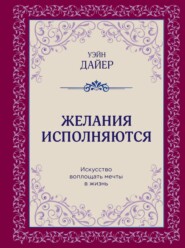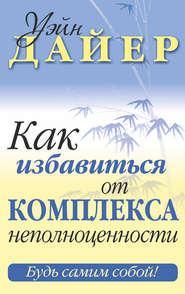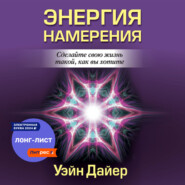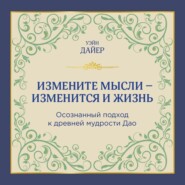По всем вопросам обращайтесь на: info@litportal.ru
(©) 2003-2025.
✖
Wisdom of The Ages: 60 Days to Enlightenment
Автор
Год написания книги
2019
Настройки чтения
Размер шрифта
Высота строк
Поля
The moving finger that Omar Khayyám refers to is your body. Once it writes it is complete, and there is absolutely nothing that you can do to unwrite it. None of your tears will erase a single word of your written story. No amount of wit, prayer, and piety can change a single drop of your wake. It is a trail that you have left behind. While you may benefit by reviewing that trail, you must come to a knowing within you that only your present moment thoughts of how you process the wake are responsible for your life today.
It has been said many times that circumstances do not make a man, they reveal him. The tendency to blame our past for our current shortcomings is tempting. It is the easy road, in that we have a ready excuse for refusing to take the risks involved in driving the boat ourselves. Everyone, and I emphasize everyone, has conditions and experiences in the past that can be used as excuses for inaction. The wake of all our lives overflows with the debris of our past history. Parental shortcomings, addictions, phobias, abandonment issues, dysfunctional family members, missed opportunities, bad luck, lousy economic conditions, and even birth order are all glaring at us just below the surface in the wake of our lives. And yet the moving finger has written the story and nothing can be done to unwrite it.
Omar Khayyám reminds us from another place, another time, and another language of the simple common sense that the past is over, and not only is it over, but it is not subject to rewind or recall. Furthermore, it is an illusion to believe that the past is what drives or fails to drive your life today. That finger is still attached to your heart, and can write anything it chooses, regardless of what it wrote yesterday. Wake up and get out of the wake, and listen to the wisdom of Omar the tent-maker!
The essential lessons of this quatrain include:
Live today. Let go of all your attachment to your past as an excuse for your life conditions today. You are the product of the choices you are making right now, and nothing in your wake can affect you today if you heed this common sense.
Remove all blame from your vocabulary. Catch yourself when you find yourself using your past history as a reason for your failure to act today, and instead say, “I am free now to detach myself from what used to be.”
Let go of your tears that have been a symbol of your attachment to the past. The sadness and self-pity will not wash away one tiny fragment of your past. Gently remind the wounded part of yourself that that was then and this is now. Learn from those experiences. Bless them as great teachers, and then come rushing back to the working unit of your life, now! There is a past, but not now. There is a future, but not now. From a thousand years ago grasp this simple truth and write your life with it!
PRAYER (#ulink_be7ecc05-c0ac-55dd-902b-97e76d5c8764)
Lord, make me an instrument of Your Peace.
Where there is hatred, let me sow love;
Where there is injury, pardon;
Where there is doubt, faith;
Where there is despair, hope;
Where there is darkness, light;
And where there is sadness, joy.
O Divine Master, grant that I may not so much seek
To be consoled as to console;
To be understood as to understand;
To be loved as to love;
For it is in giving that we receive;
It is in pardoning that we are pardoned;
And it is in dying that we are born to eternal light.
ST. FRANCIS OF ASSISI
(1182–1226)
The Italian founder of the Franciscan order of monks, St. Francis approached religion with joyousness and a love of nature, calling all living beings his brothers and sisters.
This simple prayer is one of the most famous and enduring of all prayers in recorded history. It expresses the deep yearning within all humans to be the spiritual being who inhabits our physical form. In the words of this prayer, St. Francis describes the essential content of our highest self. I love to silently recite this prayer and also at times to say it out loud.
I believe you make direct contact with St. Francis when you recite this prayer, which was written by one of the most divinely spiritual people who has ever walked among us. The same invisible God force that flowed through this man in the twelfth and thirteenth centuries also flows through you and me. If you feel a connection to the man who wrote this prayer, you may want to read his biographies and watch a movie titled Brother Sun, Sister Moon. His life has been such an inspiration to me that, as I mention elsewhere in this book, I have visited Assisi to walk in the same woods and pray in the very chapel where he performed so many of his authenticated miracles.
This long-surviving prayer speaks to the very meaning of prayer. For many people, praying is a means of beseeching God to grant special favors. St. Teresa of Avila speaks of prayer in a far different light. She instructs us to “Direct all your prayers to one thing only, that is, to conform your will directly to the Divine will.” This is precisely what the enduring prayer of St. Francis provides. This prayer expresses a wish to be the vehicle for God’s desires rather than a request for favors from an entity outside ourselves. That is a radical shift for most of us, and it is a beginning step toward spiritual enlightenment.
To ask for the strength to sow love where there is hatred, hope where there is despair, and light where there is darkness is to ask to be free from the pettiness and judgment that imprisons us. It is a request to be an expression of the powerful love that we attribute to the Creator and that is part of our being. Recently I recognized an opportunity to do just that.
I had played in a doubles tennis match with three other men. One of the men on the losing side was annoyingly obnoxious as the match progressed. He slammed his racquet and swore frequently during the match. When we finished playing he stormed off the court, refusing to shake hands. As the remaining threesome, including me, walked off the court, I heard my two fellow players condemning the actions and attitude of the now-absent man. The temptation to join in talking about what a jerk he had been almost overwhelmed the words, “Where there is despair, [let me sow] hope; … where there is sadness, joy …” which have become a part of me since I often recite the prayer.
When we got off the courts, we saw the angry, hurt man. I went over and put my arm around him and simply said, “We all have our bad moments.” It was not any verbal superiority that caused me to act this way. The words of a simple man of God, who lived more than eight hundred years before me, on another continent, spoke to and through me that day on the tennis court.
When we know that we are never alone, we change our strategy for prayer and pray to that which we are already connected to; the highest, most sacred aspect of our own being. If God is everywhere, then there is no place that God is not, including within ourselves. Armed with this awareness, we can pray and ask for nothing but our own moral strength. Instead of asking to be sheltered from danger, we ask for the strength to be fearless. Rather than asking for the removal of pain, we seek the ability to transcend and conquer it. We no longer assume that we know what we need and what will help us in this moment. Yet our experience teaches us that many of the things that we would never have requested have turned out to be the most beneficial. As William Shakespeare once put it, “We, ignorant of ourselves, beg often our own harms, which the wise powers deny us for our own good.”
This prayer of St. Francis is a way of seeking to practice in everyday life consoling, understanding, pardoning, and giving actions. We all have these capacities within us, and frequently we are moved to act in these ways. However, we are most often asking others, including that entity we think is outside us called God, to console us, understand us, forgive us, and provide for us.
By reciting this simple prayer we are taking steps to true spiritual growth. We are leaving ego behind and allowing our sacred self to be a dominant force in our lives. The very private, almost universal, awareness or practice of prayer is an incredibly powerful force for transformation in our lives when we place the emphasis of this activity on a kind of communion with the infinite in which we ask for the strength and courage to operate our daily lives from the principles laid out by St. Francis.
I’ve always loved the story of the teacher who told a spiritually advanced young avatar, “I’ll give you an orange if you can tell me where God is!” The young person replied, “I’ll give you two oranges if you can tell me where God is not!” The moral: God is everywhere. When you pray to God, you pray to a silent and powerful eternal presence that is a part of yourself. Commune with this presence without any idea of being separate. Then practice the divine words of St. Francis, and begin to put them to work in as many places as you can each day. Ralph Waldo Emerson wrote the following words on the subject of prayer. I will close this essay with his insights.
“Prayer as a means to effect a private end is theft and meanness. It supposes dualism in nature and consciousness. As soon as the man is one with God he will not beg. He will then see prayer in all action.”
I suggest you practice the words of St. Francis by incorporating the following ideas into your daily life:
Make a daily practice of privately reciting the words of this prayer. Just by saying the words, you will find yourself beginning to act on them throughout the day.
If you find yourself in a confrontation of any kind with anyone, be it a family member or a stranger, before reacting ask yourself, “Is what I am about to say motivated by my need to be right, or my desire to be kind?” Then pick a response that stems from kindness, regardless of how your ego objects.
Practice sending love where you previously radiated hate, particularly when reading newspapers or watching the news on television. By sowing love in the face of hatred, regardless of how difficult it may seem, you will become part of the solution to hatred in our world. This will require strong vigilance on your part to overcome your cultural conditioning of an eye-for-an-eye mentality.
Look into your heart and be honest about all the people in your past who have harmed you in any way. Where there is pain, practice pardon. Forgiveness is the very foundation of spiritual awakening, and it is what St. Francis is speaking of in this divine prayer.
GRIEF AS A BLESSING (#ulink_9ffd8061-e662-5425-bcea-fa1f05ecc889)
I saw grief drinking a cup of sorrow and called out, “It tastes sweet, does it not?” “You’ve caught me,” grief answered, “and you’ve ruined my business, how can I sell sorrow when you know it’s a blessing?”
JALALUDDIN RUMI
(1207–1273)
Persian mystical poet and Sufi saint Jalaluddin Rumi writes about the pure love we can achieve, beyond ego, in the soul’s divine longing and ecstasy of union with God.
Oh how we love to grieve. We even read books about how important the grieving process is to our recovery, and then we go so far as to identify grief as a necessary stage of sorrow that we have to experience to overcome our losses and regain our sanity. But Jalaluddin Rumi, a thirteenth-century mystical poet, writing in the area known today as Afghanistan, sends a message from the Middle Ages. He suggests that grief is a blessing, rather than something to tolerate as a necessary evil on the way to recovery. It is not sorrowful at all, but instead it is an opportunity to drink the sweet nectar that is available in the dark moments of our lives.
For most of us, grieving is how we react to a loss or a tragic event, and it seems to be a natural way of reacting to the experience of pain in our lives. But if we knew the wisdom of Rumi’s words, we might be able to shift right in the middle of this grieving process and turn our sorrow into something sweet-tasting.
One of the great teachings of my life came from my exploration of the Kabbalah, a mystical text of Judaism that goes back many centuries, as do Rumi’s teachings. The simple lesson for me was “The falls of our life provide us with the energy to propel ourselves to a higher level.” I read and reread this ancient wisdom. As I allowed it to soothe the sharp anguish of life’s painful moments, I began to incorporate this wisdom during times of sadness and grief. I discovered the truth of this idea that every fall provides us the opportunity to generate the necessary energy to move to higher consciousness. Every sinking into despair has within it an energy to move us higher.
How many times in your life have dark times of despair, such as some kind of an accident, an illness, a financial disaster, a breakup in a relationship, a fire or flood, a loss of property, or a death, propelled you into the stages of anguish, anger, denial, and then grief? Like most of us, you sink into sorrow and feel the need to tell everyone about your misfortune. Ultimately, after a long period of time, you begin to rise above it and reach the state of acceptance.















